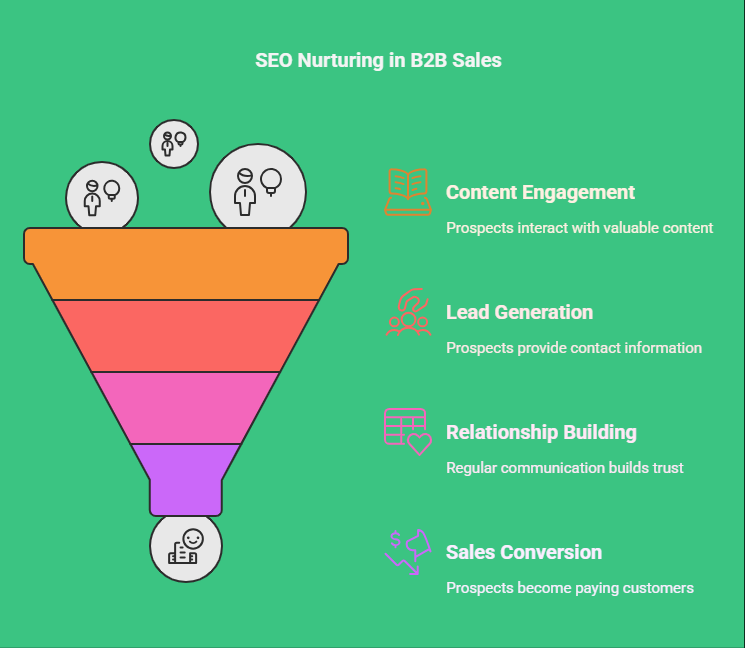I hope you enjoy reading this blog post.
If you want to get more traffic, Contact Us

Click Here - Free 30-Minute Strategy Session
Be quick! FREE spots are almost gone for this Month. Free Quote

Search Engine Optimisation (SEO) plays a pivotal role in B2B marketing by ensuring businesses establish visibility during a long sales cycle. It focuses on enhancing website rankings on search engines, driving organic traffic, and building brand authority. B2B marketers use SEO to connect with decision-makers by targeting industry-specific keywords aligned with prospect intent.
Key components of SEO in B2B marketing include:

Click Here – Free 30-Minute Strategy Session
Be quick! FREE spots are almost gone for this Month
SEO aligns with nurturing strategies, ensuring consistent engagement across touchpoints.
The long B2B sales cycle is characterised by multiple decision-makers, extensive research, and high-stakes investments. It typically spans weeks or months due to the complexity of the products or services involved and the higher costs. Unlike B2C sales, B2B transactions demand tailored solutions, detailed demonstrations, and regular follow-ups.
Several factors influence this cycle, including organisational size, industry regulations, and client-specific requirements. Prospects evaluate vendors through detailed comparisons, seeking assurance of value and reliability. Effective communication and educating prospects play a crucial role in building trust, ultimately influencing conversions.
A long sales cycle requires strategic planning, nurturing customers throughout their journey for a successful outcome.
B2B sales cycles are often lengthy due to high-value purchases, involving multiple stakeholders and extensive research. Prospects require nurturing as their journey typically includes numerous decision-making stages. Building trust becomes essential, as businesses seek to reduce perceived risks before committing.
Nurturing maintains engagement through valuable content that aligns with their evolving needs. Regular touchpoints, such as emails or educational resources, reinforce a brand’s reliability and expertise. Prospects may return to the same concerns multiple times, necessitating consistent messaging.
A sustained nurturing strategy ensures a business remains top-of-mind, guiding prospects steadily from awareness to decision, all while addressing objections and demonstrating value effectively.
Effective SEO begins with understanding the target audience’s needs and pain points. By optimising a website for keywords that align with early-stage research queries, businesses can capture attention at the start of the buyer’s journey.
By aligning SEO with initial pain points or curiosities, businesses can establish authority and earn trust early in the process.
Effective content creation for each funnel stage aligns with the prospect’s intent and decision-making process.
Each stage requires a customised approach that nurtures prospects seamlessly toward conversion.
Keywords serve as critical connectors between businesses and their target audiences throughout the extended B2B sales cycle. Identifying and implementing high-intent and industry-specific keywords ensures that content aligns with prospects’ evolving search behaviour.
Effective keyword usage allows businesses to address multiple stages of the buyer journey. For instance:
Consistency in optimising evergreen content with well-researched keywords contributes to sustained organic traffic and audience retention. Regularly updating keyword strategies ensures alignment with market trends and changing search behaviours.
Targeted SEO strategies enable businesses to establish credibility and become a trusted resource within their niche. Optimising content with high-value keywords ensures alignment with prospects’ search intent, enhancing their confidence in the brand. Creating authoritative content such as whitepapers, case studies, and industry-relevant blogs attracts and nurtures prospects naturally over time.
Through precise optimisation techniques, businesses can present themselves as industry leaders, fostering deeper trust and engagement during lengthy B2B sales cycles.
Search Engine Optimisation (SEO) empowers prospects by providing access to relevant, authoritative, and easily digestible information throughout their decision-making process. It ensures that high-value content tailored to their needs appears when they search for educational resources or solutions to specific challenges.
Key elements like keyword optimisation ensure prospects encounter tailored content that resonates with their pain points. By prioritising user experience, SEO promotes intuitive navigation, faster load times, and mobile responsiveness, simplifying access to critical information. Moreover, SEO signals such as backlinks and on-page metadata reinforce trustworthiness, guiding prospects towards informed decisions backed by credible sources at every stage of the conversion funnel.
To assess SEO’s impact on the B2B sales cycle, organisations must utilise metrics that align with the buyer journey. Key performance indicators (KPIs) include organic traffic, keyword rankings, and user engagement metrics such as bounce rate and time on page. Businesses should also measure lead generation by tracking conversions through forms, gated content, or demo requests.
Advanced tools like Google Analytics and CRM software enable attribution modelling to map SEO activities to sales outcomes. Using UTM parameters helps track campaign-specific traffic contributions. Regular reporting ensures stakeholders understand the role of SEO in nurturing prospects and advancing them through the funnel.
To enhance prospect nurturing during a lengthy B2B sales cycle, aligning SEO with broader marketing efforts proves essential. Paid advertising campaigns, for instance, can be seamlessly integrated with SEO to achieve reinforced keyword targeting and visibility. Email marketing can be enriched by aligning content topics with SEO-driven insights, ensuring prospects receive high-value, targeted information. Social media strategies gain traction when SEO keywords and content themes are incorporated into posts, amplifying reach and engagement. Additionally, collaborating SEO with content marketing ensures a unified message, improved lead scoring, and better engagement metrics, driving prospects further along the funnel efficiently.

LEAVE A REPLY